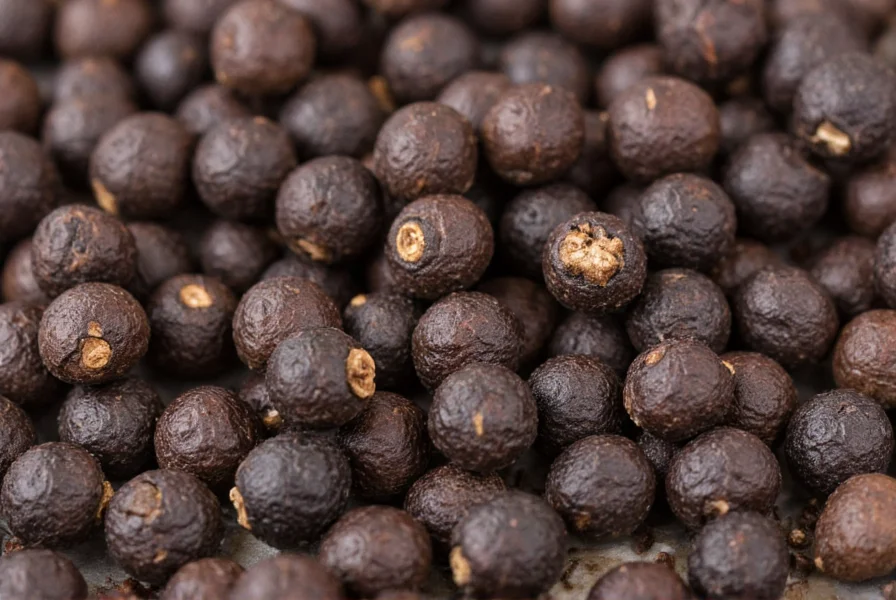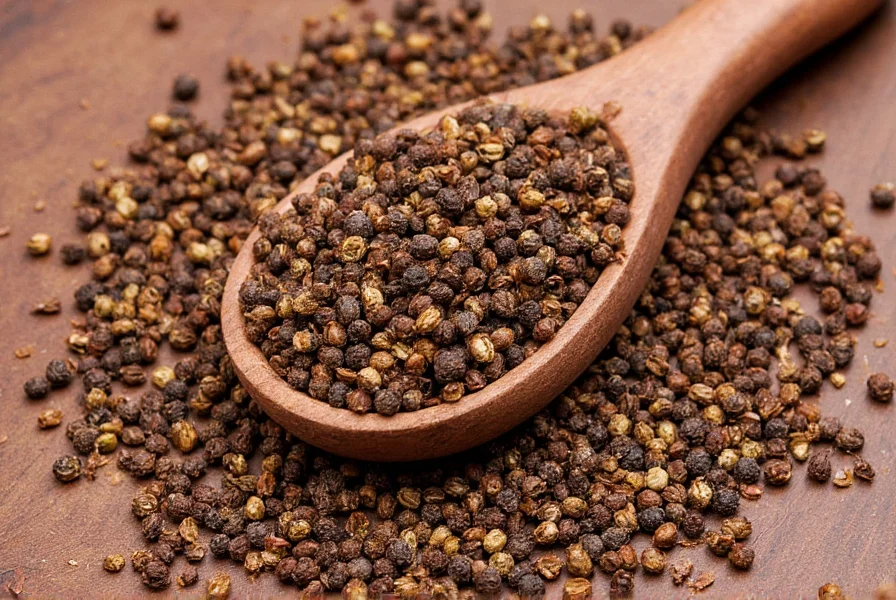Tellicherry pepper represents the pinnacle of black pepper quality, distinguished by its size, maturity, and complex flavor development. Unlike regular black pepper which uses peppercorns of varying sizes and ripeness, authentic Tellicherry pepper comes only from fully ripe berries that have reached at least 4.25mm in diameter before harvesting. This careful selection process creates a spice with remarkable depth that professional chefs and serious home cooks prize for its ability to enhance dishes without overwhelming them.
Origin and Production Standards
The name "Tellicherry" refers to Thalassery, a coastal town in Kerala, India that historically served as a major pepper trading port. While modern Tellicherry pepper comes from throughout the Malabar Coast region, it must meet strict grading criteria to earn the designation. The most critical factor is berry size - only peppercorns measuring 4.25mm or larger qualify as Tellicherry grade.
Producers harvest Tellicherry peppercorns when they're fully ripe and red, rather than picking them early like standard black pepper. This extended growing period allows complex flavor compounds to develop. After harvesting, the berries undergo sun-drying which transforms them from red to dark brown/black while concentrating their essential oils.
| Pepper Grade | Minimum Size | Ripeness at Harvest | Flavor Profile |
|---|---|---|---|
| Tellicherry Special Extra Bold (TSEB) | 4.8mm+ | Fully ripe (red) | Complex, winey, floral notes |
| Tellicherry Extra Bold (TEB) | 4.25mm+ | Fully ripe (red) | Balanced citrus and wood notes |
| Malabar Special Bold | 3.75mm+ | Semi-ripe | Standard black pepper profile |
| Regular Black Pepper | 3.35mm+ | Less ripe | Simple, sharp heat |
Flavor Profile and Culinary Applications
Tellicherry pepper's extended maturation creates a more sophisticated flavor profile than standard black pepper. You'll detect distinct top notes of dried fruit and citrus, followed by subtle floral undertones and a warm, lingering finish with less aggressive heat. This complexity makes tellicherry black pepper vs regular black pepper noticeably different when tasted side by side.
Chefs prefer Tellicherry pepper for dishes where pepper flavor should shine without dominating:
- Finishing steaks and grilled meats - The nuanced flavor complements rather than competes with premium proteins
- Cream-based sauces - Its complex notes enhance rather than overwhelm delicate dairy flavors
- Roasted vegetables - Particularly effective with root vegetables and mushrooms
- Chocolate desserts - Surprising but effective pairing that enhances cocoa notes
For optimal flavor release, always grind Tellicherry pepper fresh just before use. The volatile oils that create its distinctive aroma dissipate quickly after grinding. A quality pepper mill set to a coarse grind works best for most applications, though fine grinding works well for rubs and spice blends.

Identifying Quality Tellicherry Pepper
Unfortunately, the Tellicherry designation has become somewhat diluted in the marketplace. True Tellicherry pepper should meet these quality indicators:
- Uniform size - All peppercorns should be consistently large (4.25mm+)
- Deep brown color - Not black (excessive blackening suggests over-processing)
- Strong aroma - Should release complex citrus and floral notes when crushed
- Dry texture - Properly dried peppercorns feel hard and brittle
When shopping for tellicherry pepper buying guide considerations, look for packaging that specifies the exact grade (TEB or TSEB), origin (Kerala, India), and harvest year. Reputable spice companies often include this information. Avoid products simply labeled "Tellicherry style" or "Tellicherry blend" as these typically contain lower-grade pepper.
Storage Recommendations
To preserve Tellicherry pepper's delicate flavor compounds, proper storage matters more than with standard black pepper. Follow these tellicherry pepper storage tips:
- Store in an airtight container away from light and heat
- Keep whole peppercorns intact until ready to use
- Avoid storing near strong-smelling spices that could transfer odors
- Use within 1-2 years for optimal flavor (though safe indefinitely)
Refrigeration isn't necessary and may introduce moisture that degrades quality. A cool, dark pantry provides ideal conditions for maintaining tellicherry pepper quality over time.

Health Benefits and Nutritional Profile
Like all black pepper, Tellicherry pepper contains piperine, a compound with demonstrated antioxidant and anti-inflammatory properties. Research suggests piperine may enhance nutrient absorption, particularly of curcumin from turmeric. While tellicherry pepper health benefits don't significantly differ from other black pepper varieties, its higher concentration of essential oils may provide slightly more pronounced effects.
Nutritionally, one teaspoon (2g) of Tellicherry pepper contains approximately:
- 10 calories
- 0.3g protein
- 2.4g carbohydrates
- 0.2g fat
- 0.7g dietary fiber
- Significant manganese and iron
As with any spice, these nutritional contributions are minimal in typical culinary usage, but the potential health benefits of regular pepper consumption make it a valuable addition to a balanced diet.
Conclusion
Tellicherry pepper represents the highest grade of black pepper available, distinguished by its size, maturity, and complex flavor development. Understanding tellicherry pepper culinary uses helps home cooks and professionals alike elevate their dishes with nuanced pepper flavor that standard varieties cannot match. When selecting this premium spice, look for proper grading (TEB or TSEB), consistent size, and fresh aroma to ensure you're getting authentic Tellicherry pepper that delivers on its reputation as the connoisseur's choice for black pepper.
Frequently Asked Questions
What makes Tellicherry pepper different from regular black pepper?
Tellicherry pepper comes exclusively from fully ripe peppercorns measuring 4.25mm or larger, while regular black pepper uses smaller, less mature berries. This size and maturity difference creates a more complex flavor profile with citrus and floral notes in Tellicherry pepper, along with less aggressive heat compared to standard black pepper's sharper, one-dimensional flavor.
Is Tellicherry pepper worth the higher price?
For dishes where pepper flavor plays a prominent role, Tellicherry pepper's superior complexity makes it worth the investment. Its nuanced flavor shines in finishing applications like steak, roasted vegetables, and creamy sauces where regular black pepper might overwhelm. However, for recipes where pepper is just one of many spices or gets cooked for long periods, standard black pepper provides similar results at lower cost.
How should I store Tellicherry pepper to maintain freshness?
Store Tellicherry pepper in an airtight container away from light, heat, and moisture. Keep the peppercorns whole until ready to use, as grinding accelerates flavor loss. A cool, dark pantry provides ideal storage conditions. Properly stored, whole Tellicherry peppercorns maintain peak flavor for 1-2 years, though they remain safe to consume indefinitely.
Can I substitute Tellicherry pepper in recipes calling for regular black pepper?
Yes, you can substitute Tellicherry pepper for regular black pepper at a 1:1 ratio. However, because of its more complex flavor and slightly less heat, you might want to adjust the quantity based on your taste preferences. For best results, use Tellicherry pepper as a finishing spice rather than cooking it extensively, which preserves its delicate flavor notes that can dissipate with prolonged heat exposure.
How can I verify I'm buying authentic Tellicherry pepper?
Look for specific grading information (TEB or TSEB), origin (Kerala, India), and harvest year on the packaging. Authentic Tellicherry pepper should have uniformly large peppercorns (4.25mm+), a deep brown rather than black color, and release complex citrus and floral aromas when crushed. Avoid products labeled "Tellicherry style" or "Tellicherry blend" as these typically contain lower-grade pepper mixed with genuine Tellicherry.











 浙公网安备
33010002000092号
浙公网安备
33010002000092号 浙B2-20120091-4
浙B2-20120091-4